What is a noun? How does a noun work? A noun typically refers to a person, place, or thing. There are many types of nouns and plural forms of abstract nouns. For example, a concrete noun, which is a type of noun that is perceived the senses (taste, touch, smell) would be Apple. Nouns are an essential part of speech.
What is a noun?
A noun is a word that identifies a place, thing, name, animal, or anything with an identity.A noun can be living, non-living, countable, non-countable, tangible, or non-tangible.
| Form | Definition |
| Noun | A noun is a word that names a person, place, thing, or idea. |
Deepen your understanding of nouns with a list of comprehensive noun examples.
Types of nouns
Nouns that name a person
Some nouns identify a person’s name, irrespective of their gender. Use these nouns to address a specific person.
Examples
- Joe
- Beth
- Amanda
- Nancy
- Robert
- Donald
- Charles
- Joshua
- Douglas
- Edward
- Stefan
- Nina
- Philips
- George
- Mary
- Melissa
- Brenda
- April
- Lily
- Jeff
- Jefferson
Nouns that name a place
Some nouns identify a place – a state, country, town, area, lane, apartment, street, or city. Or any location existing in the present, past, and future, reality or fictional world.
For example, Hill Valley (a fictional place in California) or the USA are nouns that name a place.
Examples
- Paris
- Medford
- Texas
- UK
- India
- Maldives
- Hill road
- Buffalo
- Seattle
- Central Perk
- King Kong comic stores
- Blue dart grocery
- my living room
- the bathroom
- Fantasy land
Nouns that name things (intangible concepts, activities)
Nouns that identify intangible things – things that do not have a physical existence – are called abstract nouns.
Abstract nouns instead name a feeling, a perception, or a state of a being.
Examples
- Love
- Happiness
- Beauty
- Fear
- Panic
- Chemistry
- Biology
Abstract nouns rely on concrete nouns (nouns that have a physical existence) to complete their meaning.
Look at examples of abstract nouns in the given sentences.
- I’m in love with the new sci-fi book by Issac Asimov.
- Ron’s happiness was at its peak when he discovered that Lucas had brought him his favorite apartment.
- Her beauty was mesmerizing.
- Nina and Bonnie share great chemistry.
Difference between a proper noun and a common noun
A proper noun is a distinctive identity given to a noun. It always begins with a capital letter, irrespective of its position in a sentence. For example, Lucas and Maria stay in Germany.
On the other hand, a common noun is a group identity or a general identity given to a noun. They don’t begin with a capital letter. For example, A boy and a girl are studying Math.
Compare this list of examples to understand proper and common nouns better.
Examples of proper nouns vs. common nouns
City of New York
Girl Kristine
Animal Hippopotamus
Color Violet
Flower Rose
Subject English
University Oxford University
Apartment 21/B
Season Spring
Friend Mathew
Types of common nouns
There are three classifications for common nouns:
- Concrete nouns
- Abstract nouns
- Collective nouns
Concrete nouns
Concrete nouns identify a material thing. You can sense all the concrete nouns with human touch, sight, smell, taste, or sound.
Examples
- Door
- Book
- Chair
- Pencil
- Laptop
- Suitcase
- Wardrobe
- Coffee beans
- Milk
Abstract nouns identify intangible and nonmaterial things. You can’t sense them directly, but you understand that it exists through external actions or signs.
For example, anger is an abstract noun. So you can’t see it directly but can gauge it through different (indirect) signs like a person yelling or throwing things forcedly.
Collective nouns
Collective nouns identify a group of things or nouns—for example, a bush of thorns, a bunch of flowers, or a pack of spades.
Use collective nouns when you want to address a group of nouns as a unit simultaneously.
Some other examples of collective nouns include:
- A flock of bees
- A pack of wolves
- An army of ants
- A crew of sailors
- A troop of warriors
- A grove of trees
- A bushel of apples
Grammar rules
- Only capitalize common nouns when they are the beginning word of the sentence.
For example:
1 – Lock the door.
Here, ‘door is a common noun, but it’s not capitalized.
2 – Coffee is the best therapy!
Here, coffee is a common noun, and it’s capitalized since it’s the beginning word of the sentence.
Here are some more examples to determine the proper capitalization of common nouns.
- Incorrect: Nina is the President of the happy club.
- Correct: Nina is the president of the happy club.
- Incorrect: Samuel eats four Bananas a day.
- Correct: Samuel eats four bananas a day.
Nouns as subject
A noun is also a subject. Therefore, you usually refer to the subject and construct the sentence around it.
Take the noun, Mandy, for example.
- Mandy is cooking sausages.
Here Mandy is the noun and the subject, and you construct the sentence around it by placing an action – cooking, and the object – sausages around it.
Take another noun, Melissa.
- Melissa leads the content team at Blue House publishers.
Here Melissa is the noun and the subject, and you construct the sentence around it by placing an action – leads and the object – content team at Blue House publishers around it.
Grammar rules
For nouns as a subject, the noun used should be the performer of the verb in the sentence.
In Mandy and Melissa’s example, they are the performers of the verb ‘cooking’ and ‘leads,’ respectively.
Nouns as objects
A noun is also an object – direct or indirect. The ‘object’ is a noun at the receiving end of the verb. You usually refer to the object and construct the sentence around it.
Take the noun, laptop, for example.
- Assemble the laptop.
Here, ‘laptop’ is a noun and an object – you construct the sentence around it.
Take another noun, bookshelf.
- Clean the bookshelf.
Here, ‘bookshelf’ is a noun and an object – you construct the sentence around it.
Nouns as a subject and object complement
A complement is a part of a sentence that completes the sentence.
Nouns as a subject complement is a noun that complements the subject in a sentence. It acts as the adjective of the subject.
Example
Andy is a mechanic.
Here, ‘Andy’ is the subject, and ‘mechanic’ is the noun as a subject complement.
Robin eats grapes.
Here, ‘Robin’ is the subject, and ‘grapes’ is the noun as a subject complement.
Nouns as an object complement is a noun that complements the object in a sentence. It acts as the adjective of the object.
Example
They call her crazy.
Here, ‘her’ is the object, and ‘crazy’ is the noun as an object complement.
Appositive nouns and nouns as modifiers
An appositive noun (or noun phrase) immediately follows another noun or noun phrase to give extra details about it.
For example, My sister, Brenda, looks after the farm.
Here, Brenda is the appositive noun next to another noun, sister, and informs us about the sister’s name.
Grammar rules
1 – A comma separates appositives that add extra information about a noun or noun phrase. You won’t change the sentence’s meaning even if you delete the ‘extra’ information.
Example
- The coat comes in two colors, red and black.
Here, color is a noun, and red and black are appositive nouns.
2 – Don’t add a comma for appositives that add essential information about a noun or noun phrase. If you delete the ‘essential’ information, you will change the sentence’s meaning.
Example
- She was sad over her lost pet.
Here, pet is a noun, and lost is an appositive noun. If you remove the appositive noun, the sentence won’t make any sense.
Regular nouns
A regular noun is any noun that forms plural by adding a -s or -es at the end.
Grammar rules
For regular nouns ending with -x, -sh, -ch, -s, -z, or -ss, add an -es at the end of the word to form plurals.
Examples
Regular nouns that form plurals by adding -es
- pen
- ball
- chimney
- apartment
- tree
Regular nouns that form plurals by adding -es
- fox
- watch
- stitch
- wristwatch
- fish
Collective nouns
Collective nouns identify a group of countable nouns—for example, team or audience.
Grammar rules
Use a singular verb for a collective noun referring to a group as a unit.
For example, Joe’s family plans a vacation every new year.
Here, family is a collective noun representing a unit. So, use the singular verb plans.
Use a plural verb for a collective noun referring to a part that makes up the group.
For example, The Blue House students sing in the choir on Tuesday.
Here, students is a collective noun representing every student from the Blue House. So, use the plural verb sing.
Examples
- Panel
- Council
- Assembly
- Army
- Pile
- Series
- Gang
- Orchestra
Countable vs. uncountable nouns
Countable nouns are nouns you can count—for example, five numbers, one pen, and seven books.
On the other hand, uncountable nouns are nouns you cannot count—for example, water, rice, and air. So you can’t count them as one water, two rice, or nine air.
Grammar rules
- Use a determiner (a/an), if needed, with a countable noun. For example, an apple or a table.
- Uncountable nouns may identify abstract nouns.
- Use a singular verb with uncountable nouns. For instance, she puts water in the glass.
Verbal noun
A verbal noun is derived from a verb but doesn’t act like a verb.
For example, ‘build’ is a verb, and ‘building’ is a verbal noun.
Examples
Verb Verbal Noun
Arrive Arrival
Decide Decision
Draw Drawing
Repeat Repetition
Gender-specific noun
Gender-specific nouns identify a masculine or a feminine noun—for example, man and woman. ‘Man’ identifies as a male, and ‘woman’ identifies as a female.
Grammar rules
Use names to identify particular gender-specific nouns—for example, Sheldon and Melissa. ‘Sheldon’ identifies as a male, and ‘Melissa’ identifies as a female.
Examples
Tiger Tigress
Rooster Hen
Peacock Peahen
Actor Actress
Attributive nouns
An attributive noun is a modifier that works as an adjective—for example, chicken soup. Here soup is a noun, and chicken is an attributive noun that provides extra details about the noun soup.
Grammar rules
- Use attributive nouns before and adjacent to a noun to make sense of its meaning.
Examples
- Telephone brand
- Horror movie
- Hawaiian island
Understanding plural nouns
How do plural nouns work?
Plural nouns refer to more than one quantity of a specified noun.
Examples of plural nouns
- Dogs
- Cats
- Men
- Wives
- Units
Common plural noun confusion
Plural nouns are either regular or irregular nouns. To decide how to form the plural of a singular noun, look at the ending letters of the word and modify the noun accordingly.
Refer to our detailed guide on Irregular plural nouns here to eliminate confusion regarding plural nouns.
understanding possessive
Possessive nouns show ownership. They usually have an apostrophe.
Example
- Tony has a car.
Here Tony is not a possessive noun.
- He is driving Tony’s car.
Here Tony is a possessive noun.
What are irregular plural nouns?
An irregular plural noun follows different rules than simply adding a -s or -es at the end of a singular noun.
Examples
- Wolf becomes Wolves.
- Person becomes People.
What are noun phrases?
A noun phrase is a group of words that pose as a single noun.
Example
- Ron and Edward study music.
The noun phrase is Ron and Edward, acting together as a single noun.
What are noun clauses?
A noun clause is a group of words containing a subject and a verb and works as a single noun. It may or may not make complete sense by itself.
Further, a noun clause can be both a subject and object of a verb in a sentence.
Examples
- Patrick will do whatever you recommend.
Here, ‘whatever you recommend’ is a noun clause and works as a noun. The noun clause contains a subject ‘you’ and a verb ‘recommend.’
- What you said was inspiring.
Here, ‘what you said’ is a noun clause and works as a noun. In the noun clause, you is the subject, said is the verb.
List of Nouns
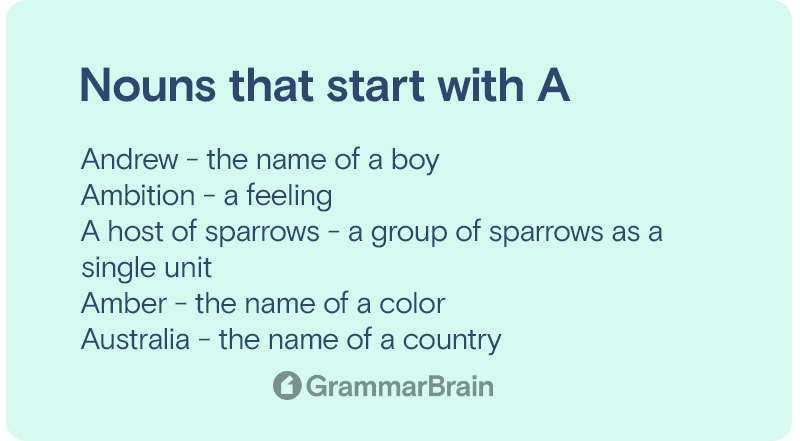
Nouns that start with A
- Andrew – the name of a boy
- Ambition – a feeling
- A host of sparrows – a group of sparrows as a single unit
- Amber – the name of a color
- Australia – the name of a country
- Ash – a powdery leftover from a burned object
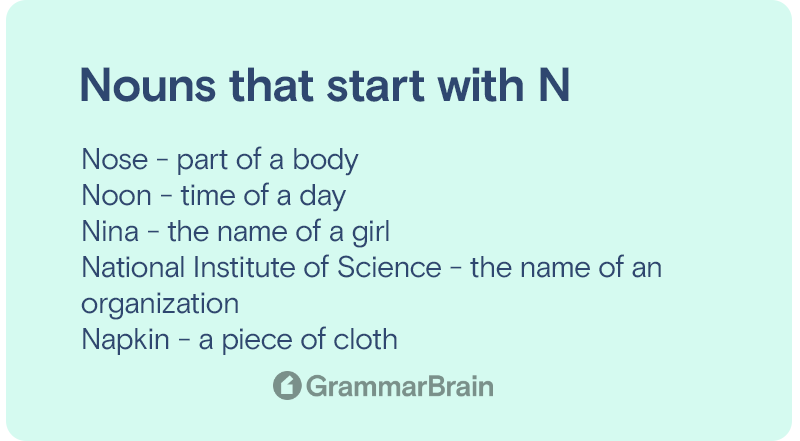
Nouns that start with N
- Nose – part of a body
- Noon – time of a day
- Nina – the name of a girl
- National Institute of Science – the name of an organization
- Napkin – a piece of cloth
- Nostalgia – a feeling of affection for the past
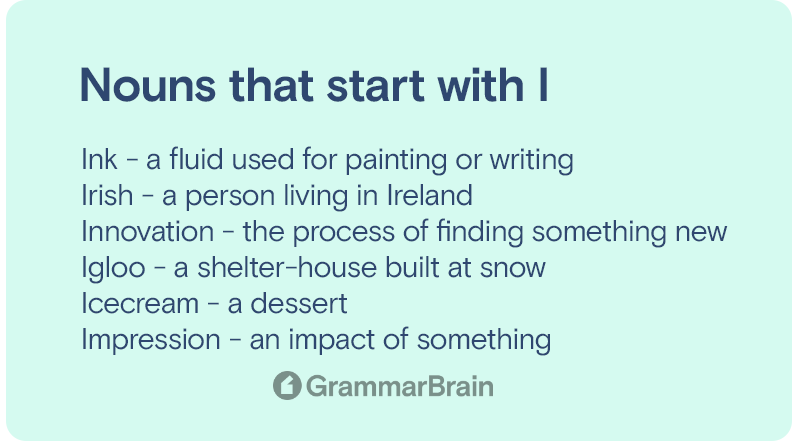
Nouns that start with I
- Ink – a fluid used for painting or writing
- Irish – a person living in Ireland
- Innovation – the process of finding something new
- Igloo – a shelter-house built at snow
- Icecream – a dessert
- Impression – an impact of something
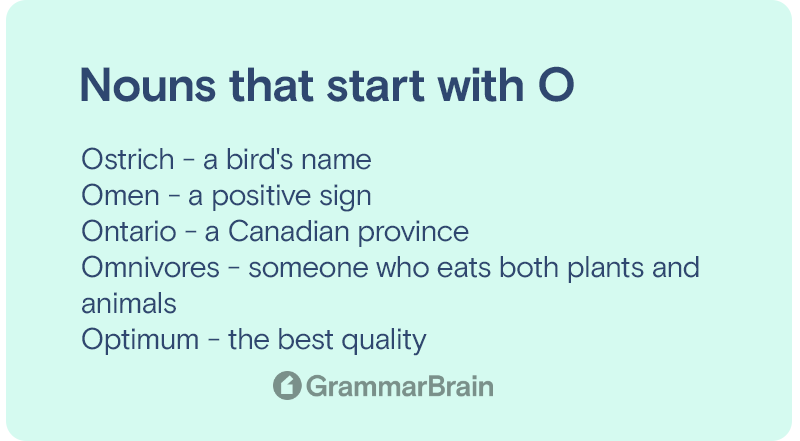
Nouns that start with O
- Ostrich – a bird’s name
- Omen – a positive sign
- Ontario – a Canadian province
- Omnivores – someone who eats both plants and animals
- Optimum – the best quality
- Oman – the name of a country
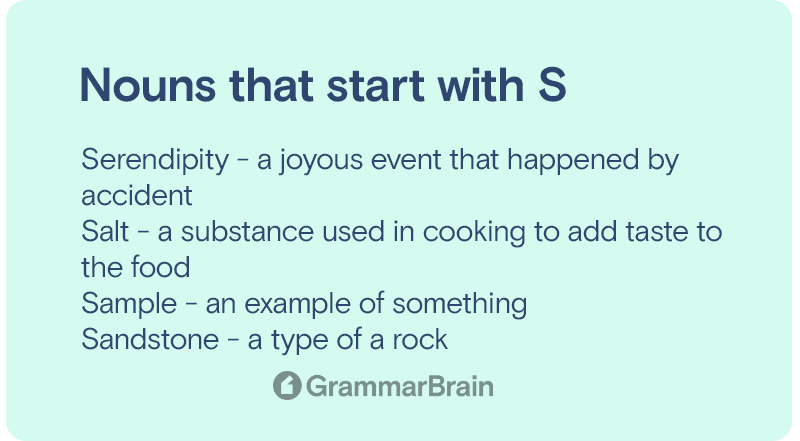
Nouns that start with S
- Serendipity – a joyous event that happened by accident
- Salt – a substance used in cooking to add taste to the food
- Sample – an example of something
- Sandstone – a type of a rock
- Solace – the feeling of peace
- Sandwich – a food snack
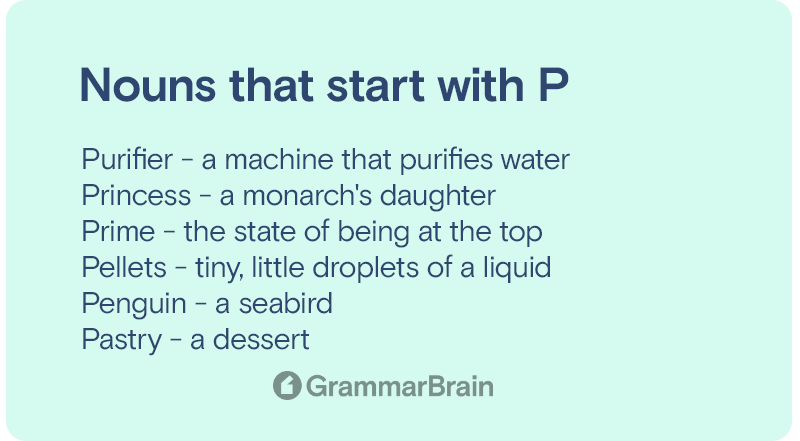
Nouns that start with P
- Purifier – a machine that purifies water
- Princess – a monarch’s daughter
- Prime – the state of being at the top
- Pellets – tiny, little droplets of a liquid
- Penguin – a seabird
- Pastry – a dessert
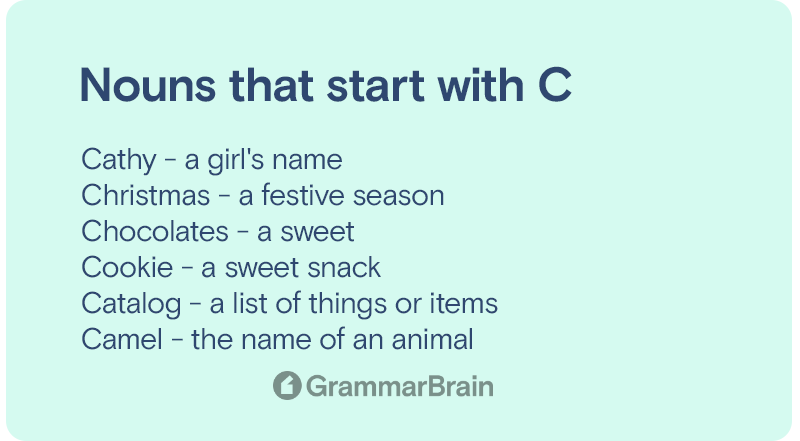
Nouns that start with C
- Cathy – a girl’s name
- Christmas – a festive season
- Chocolates – a sweet
- Cookie – a sweet snack
- Catalog – a list of things or items
- Camel – the name of an animal
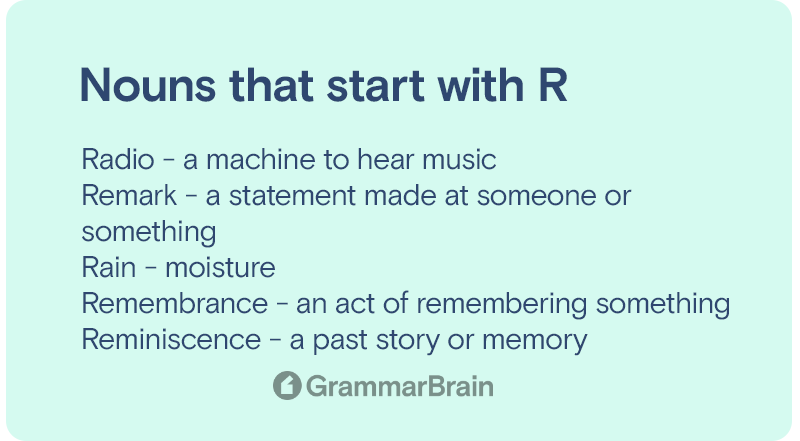
Nouns that start with R
- Radio – a machine to hear music
- Remark – a statement made at someone or something
- Rain – moisture
- Remembrance – an act of remembering something
- Reminiscence – a past story or memory
- Rebel – a person who is risen with angst
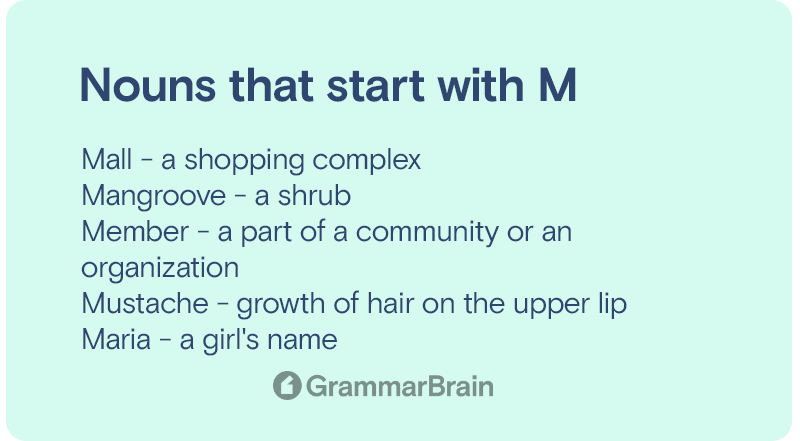
Nouns that start with M
- Mall – a shopping complex
- Mangroove – a shrub
- Member – a part of a community or an organization
- Mustache – growth of hair on the upper lip
- Maria – a girl’s name
- Medicine – a drug used to treat an illness
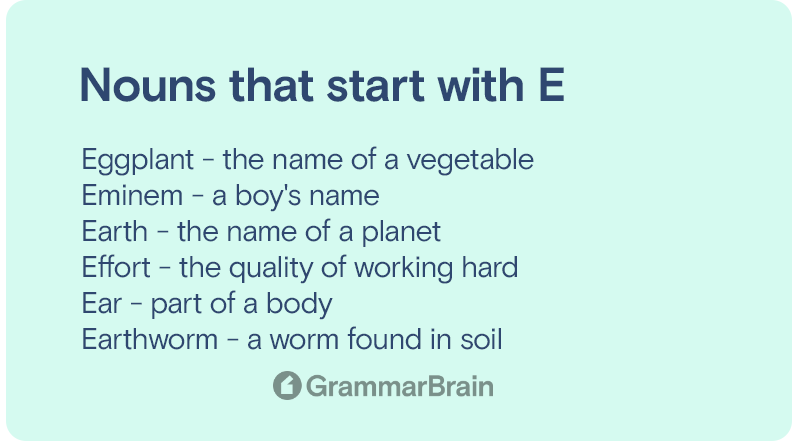
Nouns that start with E
- Eggplant – the name of a vegetable
- Eminem – a boy’s name
- Earth – the name of a planet
- Effort – the quality of working hard
- Ear – part of a body
- Earthworm – a worm found in soil
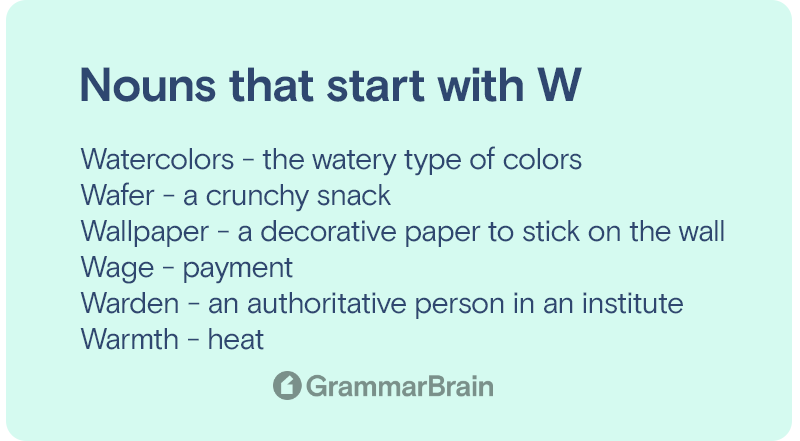
Nouns that start with W
- Watercolors – the watery type of colors
- Wafer – a crunchy snack
- Wallpaper – a decorative paper to stick on the wall
- Wage – payment
- Warden – an authoritative person in an institute
- Warmth – heat
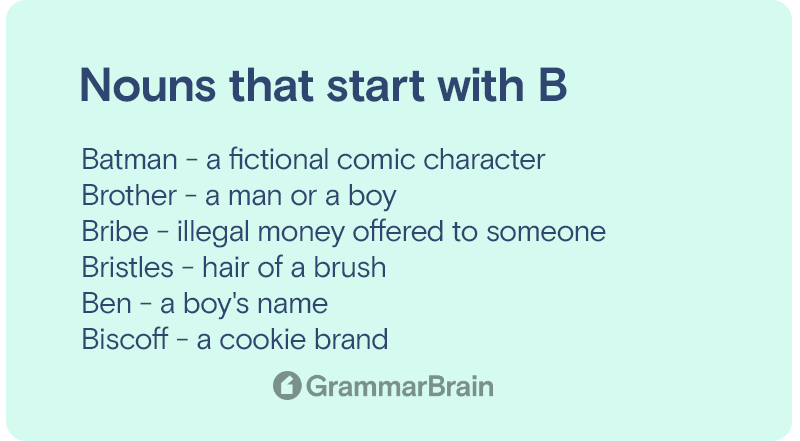
Nouns that start with B
- Batman – a fictional comic character
- Brother – a man or a boy
- Bribe – illegal money offered to someone
- Bristles – hair of a brush
- Ben – a boy’s name
- Biscoff – a cookie brand
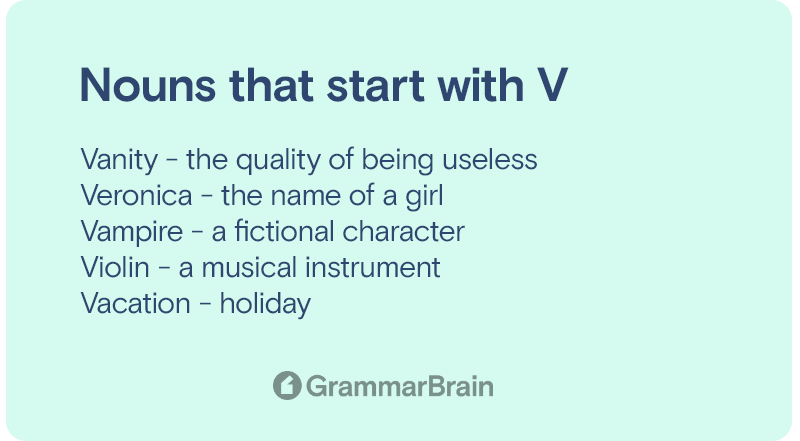
Nouns that start with V
- Vanity – the quality of being useless
- Veronica – the name of a girl
- Vampire – a fictional character
- Violin – a musical instrument
- Vacation – holiday
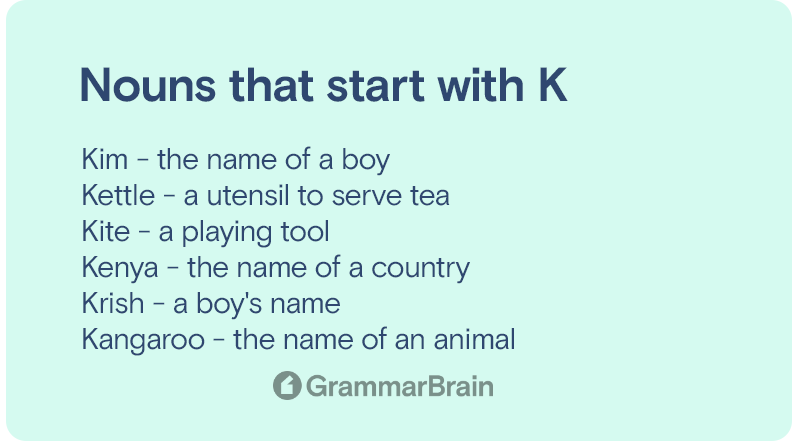
Nouns that start with K
- Kim – the name of a boy
- Kettle – a utensil to serve tea
- Kite – a playing tool
- Kenya – the name of a country
- Krish – a boy’s name
- Kangaroo – the name of an animal
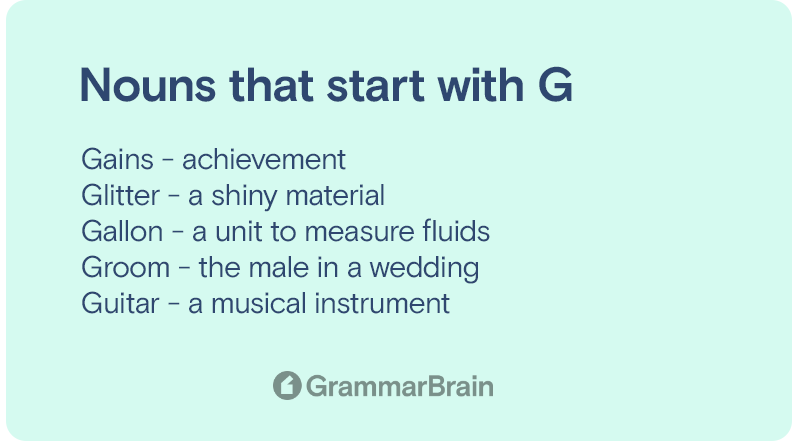
Nouns that start with G
- Gains – achievement
- Glitter – a shiny material
- Gallon – a unit to measure fluids
- Groom – the male in a wedding
- Guitar – a musical instrument
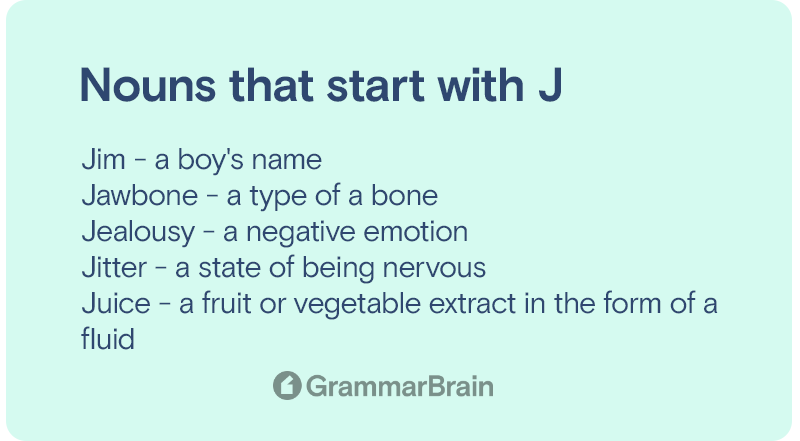
Nouns that start with J
- Jim – a boy’s name
- Jawbone – a type of a bone
- Jealousy – a negative emotion
- Jitter – a state of being nervous
- Juice – a fruit or vegetable extract in the form of a fluid
- Joe – a boy’s name
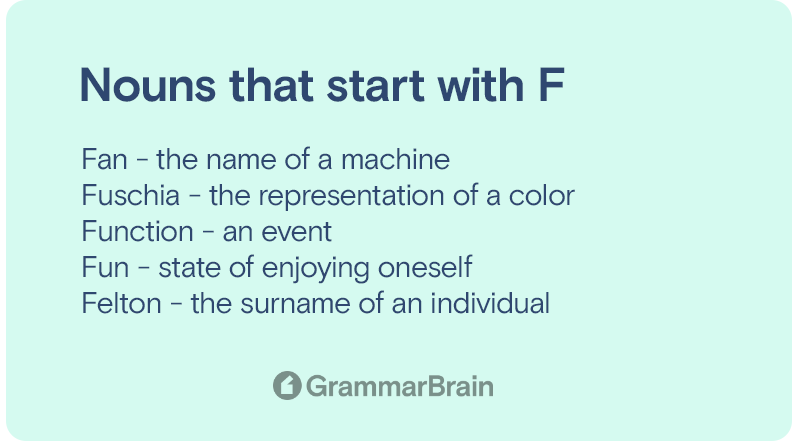
Nouns that start with F
- Fan – the name of a machine
- Fuschia – the representation of a color
- Function – an event
- Fun – state of enjoying oneself
- Felton – the surname of an individual
FAQs
How does an indirect and direct object interact with nouns?
A noun that receives the action performed by the subject usually interacts with a direct object. When a noun that is the recipient of a direct object can also get referred to as an indirect object.
Does a pronoun name a person, place, or thing?
Pronouns can identify a person. Although, they do not identify a place or thing.
What are proper nouns?
Proper nouns are words that note names, like “America” or “Sam.” Proper nouns refer to a place or name.
Can nouns be plural or singular form?
Yes, depending on how many there are (and countable or uncountable), will depend on how their plural form is used. Some nouns have a plural form identical to that of the singular: sheep/sheep.
How does a noun phrase work?
A noun phrase functions in a clause or sentence to play the role of a subject, object, or complement of a verb or preposition.
What are mass nouns?
Mass nouns are used after the words “a” or “an” or after a number.
What is an example of an abstract noun?
“Courage” is a great example of an abstract noun. Courage cannot be seen or sensed. Although, we know that it exists.
Inside this article
Fact checked:
Content is rigorously reviewed by a team of qualified and experienced fact checkers. Fact checkers review articles for factual accuracy, relevance, and timeliness. Learn more.
Core lessons
Glossary
- Abstract Noun
- Accusative Case
- Anecdote
- Antonym
- Active Sentence
- Adverb
- Adjective
- Allegory
- Alliteration
- Adjective Clause
- Adjective Phrase
- Ampersand
- Anastrophe
- Adverbial Clause
- Appositive Phrase
- Clause
- Compound Adjective
- Complex Sentence
- Compound Words
- Compound Predicate
- Common Noun
- Comparative Adjective
- Comparative and Superlative
- Compound Noun
- Compound Subject
- Compound Sentence
- Copular Verb
- Collective Noun
- Colloquialism
- Conciseness
- Consonance
- Conditional
- Concrete Noun
- Conjunction
- Conjugation
- Conditional Sentence
- Comma Splice
- Correlative Conjunction
- Coordinating Conjunction
- Coordinate Adjective
- Cumulative Adjective
- Dative Case
- Determiner
- Declarative Sentence
- Declarative Statement
- Direct Object Pronoun
- Direct Object
- Diction
- Diphthong
- Dangling Modifier
- Demonstrative Pronoun
- Demonstrative Adjective
- Direct Characterization
- Definite Article
- Doublespeak
- False Dilemma Fallacy
- Future Perfect Progressive
- Future Simple
- Future Perfect Continuous
- Future Perfect
- First Conditional
- Irregular Adjective
- Irregular Verb
- Imperative Sentence
- Indefinite Article
- Intransitive Verb
- Introductory Phrase
- Indefinite Pronoun
- Indirect Characterization
- Interrogative Sentence
- Intensive Pronoun
- Inanimate Object
- Indefinite Tense
- Infinitive Phrase
- Interjection
- Intensifier
- Infinitive
- Indicative Mood
- Participle
- Parallelism
- Prepositional Phrase
- Past Simple Tense
- Past Continuous Tense
- Past Perfect Tense
- Past Progressive Tense
- Present Simple Tense
- Present Perfect Tense
- Personal Pronoun
- Personification
- Persuasive Writing
- Parallel Structure
- Phrasal Verb
- Predicate Adjective
- Predicate Nominative
- Phonetic Language
- Plural Noun
- Punctuation
- Punctuation Marks
- Preposition
- Preposition of Place
- Parts of Speech
- Possessive Adjective
- Possessive Determiner
- Possessive Case
- Possessive Noun
- Proper Adjective
- Proper Noun
- Present Participle
- Prefix
- Predicate



